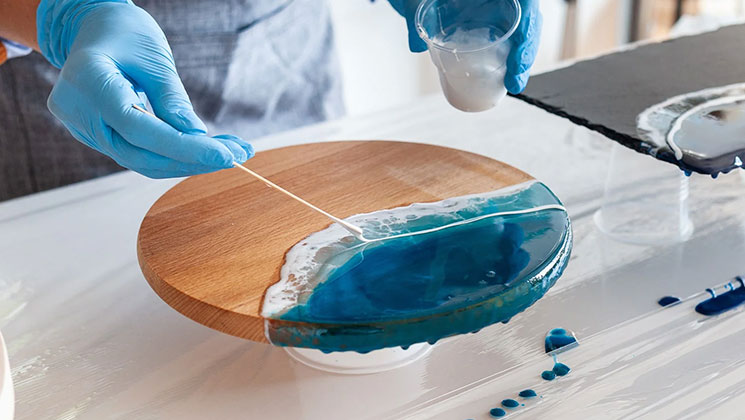Epoxy Resin
Epoxy resin is an adaptable and useful material that has a wide range of applications in various industries. It is a type of synthetic polymer that is created by mixing two different components together, an epoxy resin and a hardener.
The nature of epoxy resin and its various types
There are several types of epoxy resins with unique features and applications, including:
- Bisphenol An Epoxy Resin (DGEBA): The most commonly used type of epoxy resin is Bisphenol epoxy resins, which are produced by reacting bisphenol A with epichlorohydrin. These resins have high mechanical strength, good adhesion, and excellent chemical resistance, making them ideal for a wide range of applications such as coatings, adhesives, composites, and electronics.
- Novolac Epoxy Resin: Novolac epoxy resins are synthesized through the reaction between epichlorohydrin and phenolic novolac resins. These resins exhibit exceptional thermal stability and high cross-link density, making them ideal for use in applications that require high-temperature resistance such as coatings for chemical processing equipment, tanks, and pipelines.
- Aliphatic Epoxy Resin: Aliphatic epoxy resins are produced as a result of reacting aliphatic amines with epichlorohydrin. These resins exhibit exceptional color stability and UV resistance, which makes them an ideal choice for outdoor applications such as coatings for buildings, bridges and automobiles.
- Cycloaliphatic Epoxy Resin: Cycloaliphatic epoxy resins are produced by reacting cycloaliphatic diamines with epichlorohydrin. The low viscosity and excellent chemical resistance properties of these substances make them ideal for utilization in adhesives and coatings.
- Glycidyl amine Epoxy Resin: Glycidyl amine epoxy resins are produced by reacting amines with epichlorohydrin. They have excellent impact resistance and toughness, making them suitable for use in composites and adhesives.
The applications of epoxy resins
Epoxy resins have several various applications, including using as adhesives because of their strong bonding capabilities. The aerospace, automotive, construction, and electronics industries all use epoxy adhesives extensively.
They are used as Coatings for floors, walls, and other surfaces. They are a popular choice for commercial and industrial sectors, such as factories, due to their durable and visually appealing finish that is highly resistant to chemicals, abrasion, and impact.
Epoxy resins are used as Composites, which are known for their lightweight and strong, making them ideal for use in aerospace, automotive, and sporting goods applications.
Click on the link below to read more:

